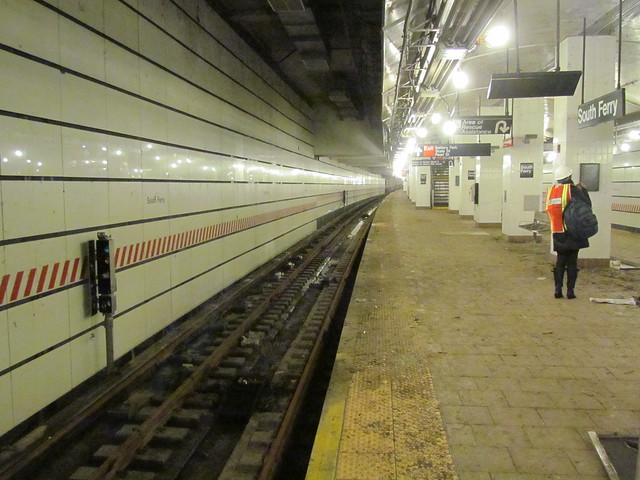
New Jersey Transit service into Hoboken has been suspended since Thursday’s crash. (Photo by Ross Bauer)
It’s been a rough few days for New Jersey as the Garden State comes to grips with the fallout from Thursday’s fatal trash crash. Gov. Chris Christie, busy cavorting with the GOP presidential nominee, came home just quick enough to help implement an ex post quick fix to the state’s transportation funding crisis, and while no one knows if the New Jersey Transit train was speeding or by how much, the engineer claims to have no memory of last week’s incident. As the NTSB, it is a day of reckoning for New Jersey.
In the immediate aftermath of the crash, in a clear case of political CYA, Gov. Christie had what many think may have been his “come to Jesus” moment over transportation funding, except it was a pyrrhic victory. Christie agreed to a 23-cent increase in the state’s gas tax to add billions of dollars to the state’s empty Transportation Trust Fund while New Jersey will cut its estate tax and sales tax. If this seems to be a regressive step, well, it is, but it was also high time for New Jersey to raise its gas tax. The state still features the cheapest gas around but now by a bit less than before. That the funding measure came amidst the fallout from a fatal crash speaks volumes about New Jersey’s transportation approach.
That is, in fact, the point Nicole Gelinas made in a piece earlier this week on the crash and funding agreement. New Jersey, she wrote, was not prepared to handle a disaster, and a disaster is what it got.
Would investment in better technology have averted Thursday’s crash? It’s impossible to know. New York and Amtrak aren’t flat broke like New Jersey is, but they’ve been slow, too, in rolling out automated-stop technology. Capital investments would give people a better day-to-day commute — and could avert a future disaster. New Jersey needs to fund about $5 billion out of the $20 billion cost of building a new tunnel across the Hudson River to do major repairs to the existing, century-old tunnel. But it has no idea where it’s going to get that money.
Just how bad are the decisions state officials have been making? New Jersey continues to squander the infrastructure money it does have on trifles and amusements. Last month, as the Bond Buyer reported, the state made plans to issue $1.2 billion in debt to fund a long-delayed “megamall” in East Rutherford.
Using scarce tax dollars to fund a mall made no sense in 2002, when the state launched the bizarre project, and it makes less sense today. Maybe, though, Christie and lawmakers can prod the mall’s owners to add an indoor miniature train to the planned indoor ski slope and water slide. At least, then, the state could say it’s working on some train project.
Meanwhile, as more information regarding New Jersey Transit has reached public eyes and ears this week, we have since learned what many have already known: The agency does not have a good safety record, and the Federal Railroad Administration has noticed numerous safety lapses in recent years. It is, as Bloomberg noted, a test of a beleaguered system that cannot meet passenger delay, one The Times noted suffers from “neglect and mismanagement.”
As the feds dig into the causes of this crash and service remains suspended into Hoboken, it seems that New Jersey Transit is on the abyss of a disaster. It has no leadership, and the board hasn’t held meetings in months. No one in Trenton seems to care, and Christie has over a year left in his tenure. The state’s next governor will have a headache, and one very important to the region, on his or her hands. Last week’s crash was illustrative of the problems; hopefully, it wasn’t a harbinger of worse things to come.




















 Was your office, like nearly everyone else’s in New York city, chirping over
Was your office, like nearly everyone else’s in New York city, chirping over